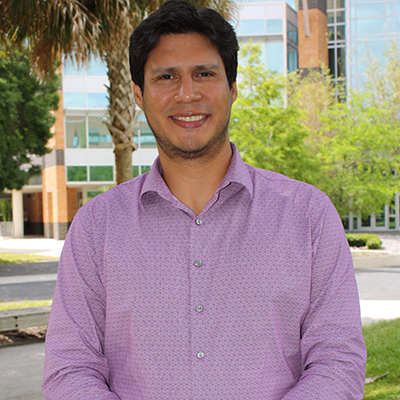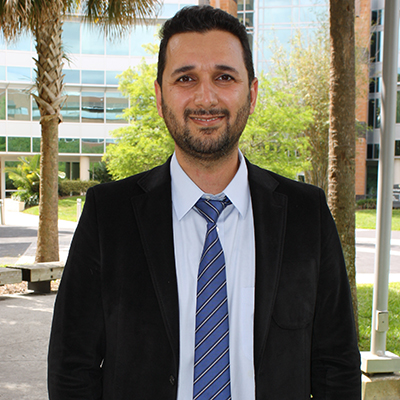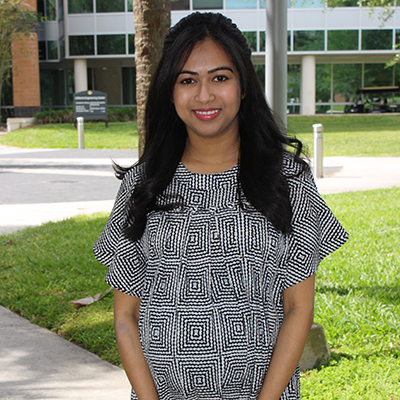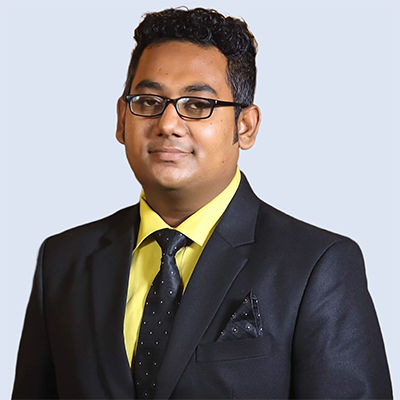
While the majority of the new graduates at commencement will be leaving a college campus for good, a select few will head to a new campus. This time however, they’ll be teaching classes, starting their own labs and advising graduate students.
Four students from the UCF Department of Electrical and Computer Engineering have earned their doctoral degrees and will start careers in academia this fall:
Jorge Manrique Castro, Ph.D. in Electrical Engineering
Tenure-track assistant professor, University of Texas at El Paso
Ph.D. advisor: Swaminathan Rajamaran
Sahin Gullu, Ph.D. in Electrical Engineering
Tenure-track assistant professor, Nevsehir Haci Bektas Veli University in Turkey
Ph.D. advisor: Issa Batarseh
Mousam Hossain, Ph.D. in Computer Engineering
Tenure-track assistant professor, Southern Illinois University, Edwardsville
Ph.D. advisor: Ronald DeMara
Muhammad Rashedul Haq Rashed, Ph.D. in Computer Engineering
Tenure-track assistant professor, University of Texas at Arlington
Ph.D. advisor: Rickard Ewetz
Hossain says she is excited about her first academic appointment in the U.S.and looks forward to balancing research and teaching in her new role.
“When it comes to research, my focus will be towards establishing myself as an independent researcher and contribute significantly towards the advancement of my field of interest,” she says. “I intend to prepare my classes in a manner that can enhance the employability of my students as well as prepare them with a strong foundation of basics and encourage and involve the students to actively participate in advanced research.”
The new graduates chose UCF for their doctoral studies for different reasons, including research specialization options, state-of-the-art facilities, the university’s top rankings and multicultural community.
“UCF provided strong academic support, relevant coursework, excellent lab facilities and collaborative opportunities which were crucial for my academic and research growth,” Rashed says.
Castro examined UCF’s faculty profiles and courses, and evaluated state and national rankings before he made his decision.
“I have to say that the university growth is been impressive. During my graduate studies, I witnessed the commitment in different areas to position UCF as a top U.S. research university,” he says. “Also, UCF is located in the amazing sunshine state of Florida, I have family ties here and the multicultural environment is great.”
Though they may be leaving UCF, as they say, “once a Knight, always a Knight.” All will depart with fond memories of the university.
For Gullu, a recipient of the department’s Best Graduate Teaching Assistant (GTA) Award, his first official teaching responsibility marks his favorite memory.
“The day I learned that I was selected as a GTA is my fondest memory because I always wanted to teach, convey my experiences and interact with students,” he says. “I am still excited to go to a class or laboratory to share my knowledge and to help my students in their careers.”
Castro says he has many fond memories of UCF, but one stands out as the most memorable.
“The one still fresh in my memory is the moment after my dissertation defense when I shook hands with my advisor and he told me, ‘Congrats Dr. Castro!’ At that moment I realized all the hard work for the last few years have paid off.”
Learn more about Castro, Gullu, Hossain and Rashed, their academic journeys, their research and their plans as they begin their new careers.
Jorge Manrique Castro ’22MS ’23PhD
Where are you from originally? Where did obtain your undergraduate/master’s degrees?
I am from Colombia. I got my undergraduate in electronics engineering from the National University of Colombia in 2007, and my master’s degree in electrical engineering from UCF in 2022. Also, I got an MBA from University of Valle in my home country in 2018.
What led you to study your respective field?
I wanted to pursue my doctoral degree in electrical engineering mainly because of two reasons: First, because my industrial experience is related to sensors, transducers and data acquisition systems, I wanted to learn about microsystems development by understanding its fundamental principles. Second, after working more than 10 years in industry, I wanted to transfer this knowledge to the future problem solvers, but also I wanted to be current in the state of the art. I think the academia is the best place to update yourself at the same time that learning from high quality faculty.
Please share in laymen’s terms your area of research.
To put it simply: I work in biomedical devices and biosensors development. I optimize the microfabrication process, designs, and generate electrical models of biological systems based on electrical measurements such as impedance, which is the opposition of the current to flow. Impedance is an important parameter to study because it is going to help us to characterize biosensors and its response to different samples.
Why did you choose UCF for your graduate education?
The Ph.D. degree in electrical engineering at UCF offers a great specialization line in micro/nano sdystems which is the area I was interested in. I also evaluated the faculty profile, courses, state and national ranks. I have to say that the university growth is been impressive. During my graduate studies, I witnessed the commitment in different areas to position UCF as a top U.S. research university. Last but not least, UCF is located in the amazing sunshine state of Florida, I have family ties here, and the multicultural environment is great.
Have you always known that you would like a career in academia?
Yes. Since I was in my undergrad program I was clear in the sense I wanted to get some industrial experience first and then I would attend the graduate school. The reason behind that is the best class experiences I had were those with experienced faculty coming from the industry. That motivated me to someday become a professor and be part of the educational progress.
How did your experiences at UCF prepare you for your future role in academia?
The experience I got in UCF is unvaluable. As researcher, I developed many skills related to the workflow in research development. I also learned how to report and disseminate research findings to the academic community. As student, ECE department offers graduate classes with lab experience, which is very important for us to materialize theory. For a person like me (hands-on experience oriented) this was an added value to my formation. Interacting with seasoned professors opened my mind to many topics. Definetly, I would like to replicate many of my experiences at UCF in my new role.
How has your Ph.D. advisor influenced your growth as a student and a researcher?
Professor Swaminathan Rajaraman was not only an academic advisor. He was a mentor and lead who helped me succeed during my doctoral studies in many ways. He is a role model I want to follow, and hopefully someday I will do the same for my students. There are many human complexities that we need to understand. This is key for any advisor to guide successful and motivated students.
What are most looking forward to as a future professor?
I am looking forward to start the Castro Lab at UTEP and connect with motivated students without fear of failing. I am enthusiastic about connecting with a huge population of Hispanic students, which is a minority I want to serve, and UTEP is the right place for that. It is my turn now to show them a different perspective about the discipline. Also, I want to guide them in how to do research in an interdisciplinary field where electrical, biomedical and material sciences fuse together. Of course, I am going to continue contributing to the academic community with my research by addressing issues of interest in our society with special focus in medical technology development.
Sahin Gullu ’24PhD
Where are you from originally? Where did obtain your undergraduate/master’s degrees?
I am from Turkey. I received my bachelor’s degree in electrical and electronics Engineering from Bulent Ecevit University in Turkey in 2013. I finished my master’s degree program in electrical engineering at Florida Institute of Technology in Melbourne, Florida in 2017.
What led you to study your respective field?
During my undergraduate studies, I was a part of a solar car project team in which I was involved with DC-DC converters, solar energy and batteries. That experience led me to work on my graduate studies in renewable energy integration, power electronics and power systems.
Please share in laymen’s terms your area of research.
My research area lies in integrating or storing energy from renewable energy sources such as solar panels or wind turbines. Depending on the renewable energy sources, DC-DC converters, DC-AC inverters and control methods are designed in order to utilize energy produced from renewable energy sources.
Why did you choose UCF for your graduate education?
I have a scholarship from my government, the Ministry of National Education in Turkey. They required me to have my graduate studies at one of the top 500 universities in the world. UCF was in the top 100 in electrical engineering in 2018. Also, the weather and Muslim communities in Orlando were my other criteria to choose UCF.
Have you always known that you would like a career in academia?
Yes. I always knew I would like to teach and conduct research at a university. Therefore, I entered the exam in Turkey that selects students for graduate studies outside of Turkey. The idea of this program to encourage students to have their graduate studies (master’s and Ph.D.s) and then go back to Turkey, and become professors at new universities in Turkey.
How did your experiences at UCF prepare you for your future role in academia?
My advisor, Dr. Issa Batarseh, helped me and shared his experiences so that I could understand what would make me successful in academia. Also, being a GTA during my Ph.D. studies helped me a lot to learn skills required to teach and interact with students.
How has your Ph.D. advisor influenced your growth as a student and a researcher?
Dr. Batarseh showed me how to interact with graduate students by his behavior and manners. Also, he taught me how to prepare proposals in order to get funds from the National Science Foundation, Department of Energy and private companies.
What are most looking forward to as a future professor?
I am looking forward to teaching my courses and establishing a laboratory that focuses on renewable energy integration.
Mousam Hossain ’24PhD
Where are you from originally? Where did obtain your undergraduate/master’s degrees?
I am originally from West Bengal, which is a state in India. I completed my undergraduate in electronics and communication engineering from the Institute of Engineering and Management, Kolkata, India and earned my master’s in computer engineering from North Dakota State University in Fargo.
What led you to study your respective field?
With the advent of the Internet of Things (IoT), there is currently a network of numerous connected devices all around us that are constantly communicating with each other and exchanging information. Modern computing has evolved significantly over the past few years, specifically in terms of processing capabilities and device technologies, to facilitate and support a wide range of IoT applications. The promise of emerging technologies for designing the next generation of computing platforms captivated me, offering solutions that could revolutionize connectivity, efficiency, and ultimately, how we interact with the world around us. The broader impact of the research area fascinated me and led me to continue in this field.
Please share in laymen’s terms your area of research.
My major contribution has been developing high-performance adaptable memory architectures that are efficient in terms of energy and resources by capitalizing on the intrinsic properties of new-age non-conventional devices. These architectures are extremely efficient and intended for use in machine learning, image processing and video processing applications.
Why did you choose UCF for your graduate education?
The research here is highly advanced and inter-disciplinary in nature, with state-of-the-art research facilities. The courses offered at UCF have a huge variety, which was one of the main reasons that primarily influenced my decision. Apart from this, the diversity and the vibrant location were also additional factors that made me choose UCF for my degree.
Have you always known that you would like a career in academia?
During my undergraduate studies, I wasn’t too sure. However, over the course of my M.S. studies at North Dakota State University, I got the chance to work as a graduate teaching assistant for a variety of classes, from sophomore level courses to advanced senior-level ones. This experience was very rewarding and helped me to acquire pedagogical skills. This made me realize that I enjoy both teaching and research, which led me to pursue a career in academia. After my M.S., I was certain of the career I wished to pursue, so I opted for my Ph.D. immediately after that.
How did your experiences at UCF prepare you for your future role in academia?
At UCF, my research and teaching experience have been especially enjoyable. I have been able to conduct meaningful and impactful research with my advisor and group, as well as teach a lab course as a graduate teaching assistant for one of the gateway courses in ECE, i.e., Computer Organization. I greatly enjoyed my interactions with the students under my guidance, whether it was in the classroom or in research. I believe these experiences have enriched and broadened my outlook, made me confident in my ability to conduct independent research, and helped me develop strong teaching skills, which will definitely help me in my future career in academia.
How has your Ph.D. advisor influenced your growth as a student and a researcher?
The role of Dr. Ronald DeMara as my advisor has been pivotal in shaping my skills as an independent researcher as well as a teacher. He has guided me throughout and provided me with the correct tools and attitude. I have learned many aspects of research from Dr. DeMara, including how to prepare technical papers, project reports, grant proposals and effectively perform literature surveys. He has also taught me how to present research ideas and results to a wider audience. In addition, recognizing my inclination towards academia, he generously extended me several opportunities to participate in educational projects, which helped me a great deal to understand effective instructional methodologies for STEM curriculum. I intend to accommodate what I have learned in the process while developing courses and preparing course materials.
What is your fondest memory of your time at UCF?
My fondest memory would be when I received the Excellence in Graduate Teaching Assistance Award at the university level at UCF, and also the Provost GTA Award at the ECE department. It served as a huge inspiration and validation of my efforts towards teaching. Also, I will always remember the first time I participated in the Spirit Splash at the UCF Reflecting Pond.
What are most looking forward to as a future professor?
This is my first academic appointment in the US. as an assistant professor, and I am very excited about it. I am looking forward to balancing my research and teaching responsibilities in this role, and applying what I have learned during my doctoral degree. When it comes to research, my focus will be towards establishing myself as an independent researcher and contribute significantly towards the advancement of my field of interest. I intend to prepare my classes in a manner that can enhance the employability of my students as well as prepare them with a strong foundation of basics, and encourage and involve the students to actively participate in advanced research.
Muhammad Rashedul Haq Rashed ’24PhD
Where are you from originally? Where did obtain your undergraduate/master’s degrees?
I am originally from Bangladesh, a beautiful and culturally rich country in South Asia. I obtained my undergraduate degree in electrical and electronic Engineering from Bangladesh University of Engineering and Technology (BUET).
What led you to study your respective field?
I’ve always loved math and physics, which inspired me to pursue a career in engineering.
Please share in laymen’s terms your area of research.
In the age of modern technologies, we are seeing an unprecedented amount of digital data worldwide. This abundance of data has given rise to data-driven applications like large language models, computer vision, metaverse, and digital twin. These new applications are fueling innovations across various fields. However, these data-intensive applications place immense demands on computational resources, creating an unprecedented burden on modern computing systems. To meet this exponential growth in computational demand, new computing systems are being explored. This has been the focus of several billion-dollar federal investments. The objective of all these programs is to substantially minimize the amount of data movement and improve the energy efficiency of emerging computing systems. My research is aligned with these federal efforts of developing future computing systems based on emerging hardware.
Why did you choose UCF for your graduate education?
I was drawn to UCF after a meeting with my current Ph.D. supervisor. His research vision and UCF’s location and weather were key factors in my decision.
Have you always known that you would like a career in academia?
Not really. It wasn’t until my third year of Ph.D. studies that I considered academia as a career path.
How did your experiences at UCF prepare you for your future role in academia?
UCF provided strong academic support, relevant coursework, excellent lab facilities and collaborative opportunities which were crucial for my academic and research growth.
How has your Ph.D. advisor influenced your growth as a student and a researcher?
My Ph.D. supervisor, Dr. Rickard Ewetz, played a pivotal role in my growth as a student and a researcher. He was a great mentor who always pushed me to solve interesting problems and publish my work in top scientific venues. He supported my goal of becoming a professor. He was also very considerate of my family life, which helped me balance work and life.
What is your fondest memory of your time at UCF?
In the second year of my Ph.D., my wife and I welcomed our first child. It will remain the highlight of my time at UCF.
What are most looking forward to as a future professor?
I am looking forward to advancing my research in emerging computing paradigms. I am also looking forward to mentoring enthusiastic graduate and undergraduate students.



